The Old Synagogue of Essen is the biggest in Germany remaining from before the war. Its majestic architecture and green-domed crown reign over the landscape of the downtown. Its restored art deco interior and towering cupola boasts one of the best acoustics in the city.
But it doesn’t have one thing — Jews.
The function of this restored house of worship is to host Jewish cultural programming for all of the city of Essen. The staff provide guided tours, talks, and special events about Judaism and Jewish history. Schools take their students there to learn about Jews and their (mostly former) life in Germany. These visitors see museum cases filled with Jewish objects: a Torah. A pair of tefillin. A siddur. Objects from the ghosts of what once was—or what still is but isn’t, at least not here.
Places like the Old Synagogue are all over Germany, although few quite as large. They have long served as central fixtures in Germany’s attempt to forge its post-Holocaust narrative as a repentant nation, committed to restoring its country’s Jewish cultural footprint (at least aesthetically) and consciously repudiating its past crimes. The living Jews of Essen, a very modest group in actual numbers, have their own, small building in town. They use the Old Synagogue for High Holidays, but almost never outside of this short, sacred window.
Because the synagogue, as its stands, is for Germans. Not so much for Jews.
Facing the tragic beauty of this hollow synagogue, my thoughts cascade back to my many encounters with German Erinnerungskultur (memory culture) while abroad with the European Cantors Association several weeks ago. What follows is the tale of five civic ceremonies — four Kristallnacht commemorations and a political protest — which revealed to me some of the unique dynamics of Jewish life in Germany today.
I. Addressing the Parliament
As delegates of the European Cantors Association (ECA), one of our roles was to be the musical voice of their Jewish community during a critical moment on the German calendar — the commemorations of the Reichsprogromnacht, known abroad as Kristallnacht. This year, the horrors of October 7th, 2023 had emerged as an eerie counterpart to those of November 9, 1938. The many ceremonies which followed attempted a political exorcism of these twin spectres of anti-Semitism, restoring the German conscience through commitment to Israel and to Jewish safety in the Fatherland.
Our first commemoration was held at the Parliament of Lower Saxony, the legislature for one of Germany’s sixteen states.1 Here, we were assigned with singing three songs in between many political speeches of the commemoration. The President of the parliament, Hanna Naber, spoke eloquently and forcefully about the Hamas atrocities and advocating Germany’s continued support of Jews and of Israel. The head of the Jewish community, Michael Fürst, spoke at length about creating a safe society for Jews (and against radical islamists who, in a protest in Lower Saxony the previous week, had called for the destruction of Israel and for a caliphate in Europe). And our own ECA executive director, Alex Klein, spoke from the heart about our shared love of freedom, democracy, and humanity as Jews and Germans.
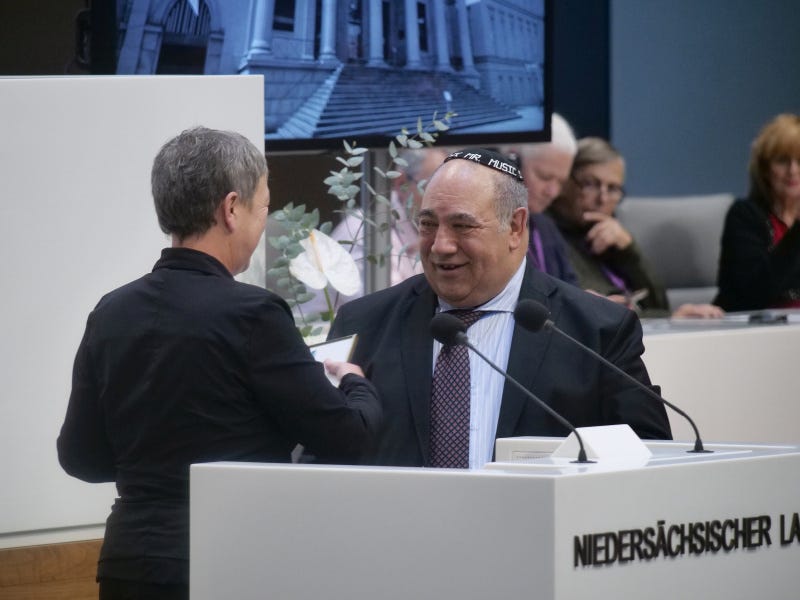
The parliament made a generous show of solidarity, which I deeply appreciate. Germany’s support means a lot, as does that of every other country in this war for the soul of the West. But this ceremony was also a complex political interaction, with left and right parties jockeying for different solutions behind the scenes (and clapping for different things). A German friend of mine felt emotionally worn by the experience, sitting next to ministers from the AfD (Germany’s far-right party) who are distrustful of muslims and have neo-nazis amongst their voter base. Even though we were bringing music and a message of solidarity, we were also clearly part of a multifaceted political act.2
There was one moment of musical levity (or at least it is funny now). The parliament had our cantors split into two groups, sitting dutifully in designated sections about thirty feet away from each other and with very bad sight lines. How, I thought to myself, were we going to sing together?
Our two options were either to all move down to the microphones or to somehow sing from our seats. But it was not clear that we were permitted to move freely about the parliament room. I was reluctant to do so, perhaps being overly sensitive to unstated rules of decorum in a foreign land. So I chose option two: Waving my arms widely like someone with a prior career in air traffic control, I conducted our de-facto double choir in three songs from our woefully distant places in the room (Actually, in the end it was four songs, as one of the speakers had stepped out and we needed to fill time).
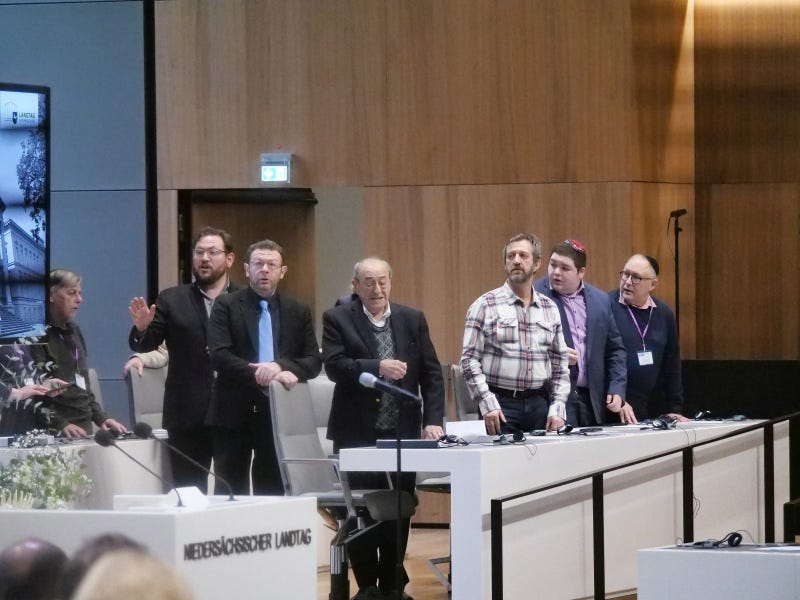
I went and watched back the video. It worked…okay. Like most music making, I think it would have sounded better if we were closer together. That’s probably true for many other things in life as well.
II. The Public Commemoration: Storytelling and Wreath Laying
From the parliament, our second commemoration was the laying of wreaths at the site of the Old Synagogue of Hannover, a dramatically large building which had been destroyed on Kristallnacht. It was a cold morning and a crowd of a few hundred had gathered to observe along with dignitaries from the city. Our role as cantors, other than to be present, was to sing the El Malei Rachamim — the memorial prayer for our martyrs in the Shoah. This was sensitively and beautifully done by my friend and colleague, Cantor Abe Lubin. It is a peculiar thing to watch a cantor rehearse the martyrdom of his people and ask God to blot out the German Nazis — in front of a large host of Germans. It was a powerful moment, but also a vulnerable one as well.
This memorial prayer was followed by several high-schoolers ascending the podium. They told the story of the fates of four Jews, all either victims or survivors of Kristallnacht. These students read with the same energy that a typical high schooler has when reading something that has been assigned in class. I suppose they did as well as could be expected. But as I learned once at Camp Ramah in Canada, communication is 55% body language, 38% percent tone, and only 7% percent words.
The wreath laying itself also yielded a contrast between the serious dignitaries and seemingly nonplussed youth. After the mayor and officials laid their flowers at the old synagogue memorial, two classes of high schoolers came forward, each student with a white rose in hand. Some looked bored, some were subtly trying to smile or sneak a joke with their friends, some looked sad. One of my colleagues stood by the exit to the memorial, personally making eye contact with each student and uttering a heartfelt danke (“Thank you”) to them. A few made eye contact in return. Even fewer nodded or responded. Many just walked on by.
Part of me can understand it. Cyclically remembering dead Jews and creating national identity and ethics based primarily on the atrocities of generations past is probably not the most effective way to inspire young people. Diaspora Jews have tried that, and even for us it has a limited shelf life as identity food. But the truth is that this narrative keeps Germany, for now, a fairly stable bulwark of philo-Semitic and pro-Israel politics. Without these ceremonies and Old Synagogues, would Germans still care?
III. Leuphana University
The first two commemorations took the better part of the morning. After swinging back to the Villa Seligmann for some lunch and whatever rest we could find, we embarked on our third and perhaps most high-profile appearance — the Reichspogromacht commemoration at Leuphana University in Lüneburg. This small town, where Bach studied music as a young man, had no Jewish community since the war. Our concert thus represented the first major concert of Jewish music there in many a generation.
We performed seven songs, which served as short palette cleansers in the verbal eight-course meal of speeches from university officials, students, and community leaders. The program was two and half hours — a half hour of which was musical content. Here again, the political message was incredibly positive, supportive of Israel, and of the freedom of Palestinians from the Hamas-ISIS regime. Many hundreds of Germans gathered in attendance. It even featured a conversation with the famous architect and former Leuphana faculty, Daniel Liebeskind, who spoke about the power of memory and the dangers of indifference.
Of additional note to this audience was the presence of Cantor Aviya Nachshon, who had already made that day’s news and was interviewed at the wreath laying. Cantor Nachshon was proud to be there representing Israel, and he sang a beautiful piece of hazzanut.
For my own part, I was happy that I got to sing a German lied by Salomon Sulzer (1806-1890), whose non-synagogue compositions I have been gathering over the years. It was the only song that night in German. I am told that it went over particularly well, partly because of that. The lyrics, Sulzer’s own, were also fitting for the evening:
Trost (“Comfort”) by Salamon Sulzer
Wenn meine Freuden mich verlassen
Wenn meine Sterne all erblassen
Und wenn mich niemand hier versteht
Ist mir noch wohl in dem Gebet
Empor, du müde Seele
Schwinge dich auf zu deinem Gott
Und dringe mit jedem ihm bekannten Schmerz
Voll Glauben an sein Vaters Herz
Flieh, Kummer! Flieht, der Zukunft sorgen
Auch meine Nacht wird bald zum morgen
Wo tränenlos meine schaut
dem Retter den Mein Herz vertraut.
Empor…
When my joy leaves me
When my stars are all faded
And when no one here understands me
I am still well in prayer
Arise, you tired soul
Soar up to your God
And press him with every pain you know
With full faith in your Father’s heart.
Flee, sorrow!
Flee from future worries,
For my night will soon be morning,
Where my tearless eye will see
the savior that my heart trusts.
A lot of classical singing is interpretation. After all, you don’t have to be a good murderer to sing Verdi’s Macbeth. What I’ve always liked about being a cantor, at least for me, is that there is less distance between text and person. And that night, I felt what I said.
It was a good concert. Many people approached to say thank you, one with tears in his eyes. So maybe we moved the dial, if only in this one sleepy university town. Like in Sulzer’s song, our tired souls certainly needed comfort and divine presence in a time when joy and understanding are fleeting.
IV. The Community Concert
After a 16-hour day of three straight Kristallnacht commemorations, our group definitely needed a break. A delayed morning minyan and engaging presentations were followed by a wonderful Shabbat of hazzanut and communal singing. But after Shabbat, we were back at it for the grand finale — a concert and Kristallnacht commemoration, this time for the Hannover community. The program succeeded in having equal proportions of speech and music, so it felt like a proper concert, complete with orchestra, choir, and soloists. The ground floor was reserved for a large host of special guests and dignitaries, including the Parliament President and her husband (who struck a very friendly tone with our ECA leadership). The upstairs gallery was for the general public and cantors not performing that night (I among them). Again, one could tell that this was a program greatly geared towards those in the orchestra seats.
I can’t remember everything that was said, except to say that it was pretty much all supportive of the Jewish community and Israel. That was great. And once again, Alex Klein gave a great, heartfelt message and our colleagues and the ECA cantors did a fantastic job with their repertoire.
When the final medley of “Hava Nagila” (yes) and “Heveinu Shalom Aleichem” was complete, we breathed a sigh of relief. We had concluded our conference, and successfully completed our four musical commemorations. There was much conviviality and the cantors stayed up late into the night singing and talking. For me, this was a joyful time. But the weight of all of the commemorations had also taken its toll. In the shadow of October 7th, all of the German proclamations of nie wieder — never again — could not distract me from the real fear that yes, it could.
Finale: An Unexpected Protest
After the concert, I traveled to Essen to meet with my PhD advisor, Dr. Diana Matut. Diana is the world’s foremost scholar of early modern Yiddish song, and an incredible performer, librettist, and lecturer. And she was recently was appointed Director of the Old Synagogue of Essen. We spent a brief time there catching up and thinking about early modern cantors. Yet very soon, I found myself thrust out into the cold amidst a teeming crowd of Germans who had gathered against the anti-Jewish hatred that had arisen in their midst.
Two weeks ago, eleven thousand protesters came to the West German city of Düsseldorf to show support for Hamas and the Palestinians. The following week, it was Essen’s turn for a protest, with three thousand in attendance. Some chanted death to Israel and to Jews. Others even carried the ISIS flags. The German community, shocked by this flagrant anti-Semitism, quickly scheduled an official counter-protest for the following week.
It was staged in front of the Old Synagogue.
The protesters were the majority of a generation who remembered WWII, who had seen the reformation of Germany in public penitence and devotion to an open society. There were younger people too, and a few children. Some Germans even wore Israeli flags and sang Hebrew songs. The mayor, the head of the Jewish community, religious leaders, and other public officials all got up to make the same clear message: support Israel, condemn Hamas, and hatred is not welcome in our streets. In all, four thousand five hundred people had shown up to make their voices heard and their values clear.
It was a really inspiring display. But whether out of fear, cold, or a desire not to be flooded with attention, I still kept my hat on, concealing my knit kippah underneath. Like the synagogue itself, this protest belonged to them.
In the Talmud, a story is told that Rabbi Yose once went off the road to pray in the ruins of Jerusalem. After his prayer, the Prophet Eljiah, who had been standing guard, asked him why he had done so. Rabbi Yose replied that he did not want to be interrupted by travelers. The Prophet responded that he should have abbreviated his prayer, and from this one learns that one should not to pray in a ruin.3
R’ Kalonymus Kalman Shapira, the rabbi of the Warsaw ghetto, taught that Rabbi Yose went to that Jerusalem ruin so that he could feel God’s pain at the destruction of the Temple. In his own world, turned as it was into a ruin, Rabbi Shapira perhaps found that praying from within its brokenness was a path to faith and compassion.
Jewish life in Germany is like praying in a ruin. Some think it should be avoided. Some clamor to rebuild it, or at least the buildings. For me, I felt like Rabbi Yose. Praying in that ruin made me feel God’s pain. Sitting in the Old Synagogue, I felt like I was inside a body with no soul. A massive golem from whose forehead God’s holy name had been erased.
And yet I felt more than ever that my tikkun in the world is to return the holiness to hollow vessels. After all, a piece of music by itself is like an empty synagogue. It requires people — with their love, intention, and meaning, to bring it alive.
It is no surprise that the cantor’s anthem is sheyibaneh — may God speedily rebuild. But rebuilding is only so that God’s presence will one day be felt within its walls.
Ken yehi ratzon. So may it be.
CORRECTION: This article was first published erroneously stating that Germany had nine states. Thanks to reader Samuel Berlad for the correction.
Later that day, the government did not pass the first draft of a bill clarifying the definition of anti-Semitism in order to ensure more effective enforcement of the law. You can see further political exchange in this reportt from the German Bundestag.
BT Berachot 3a

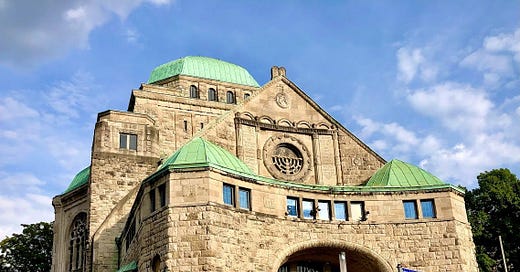



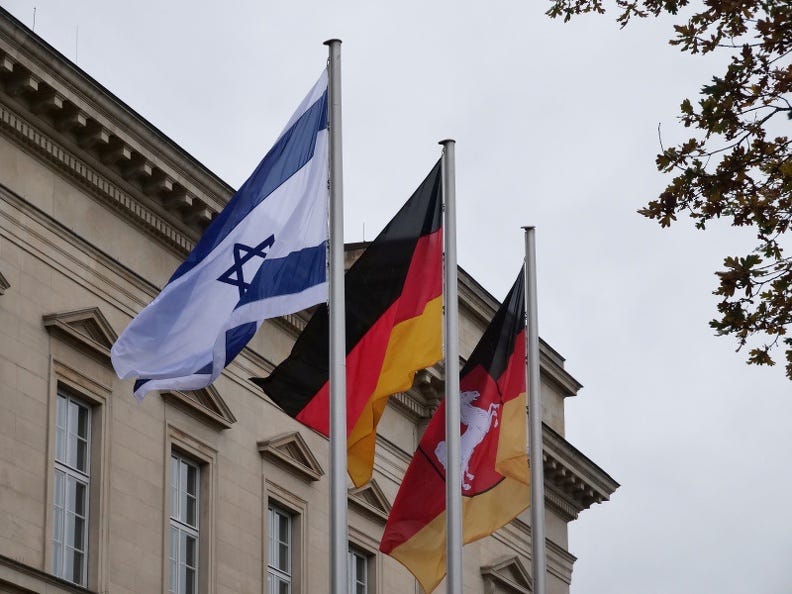
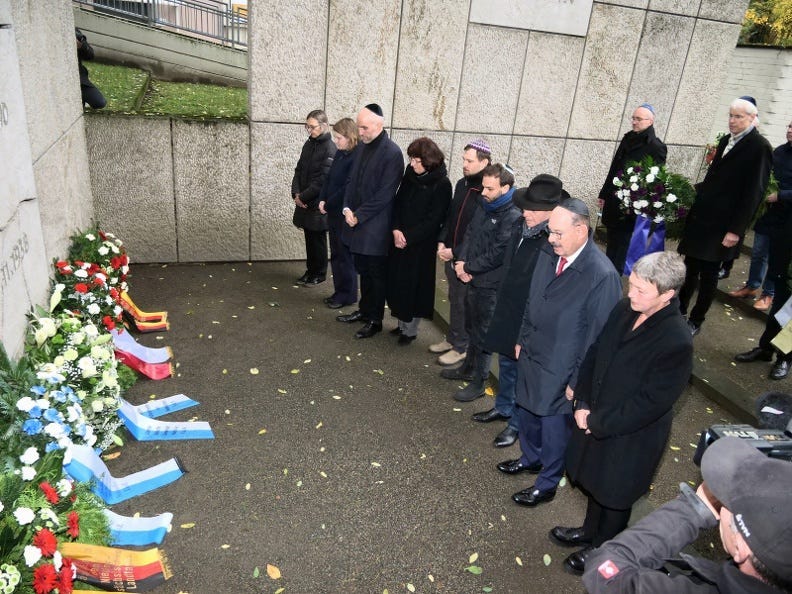
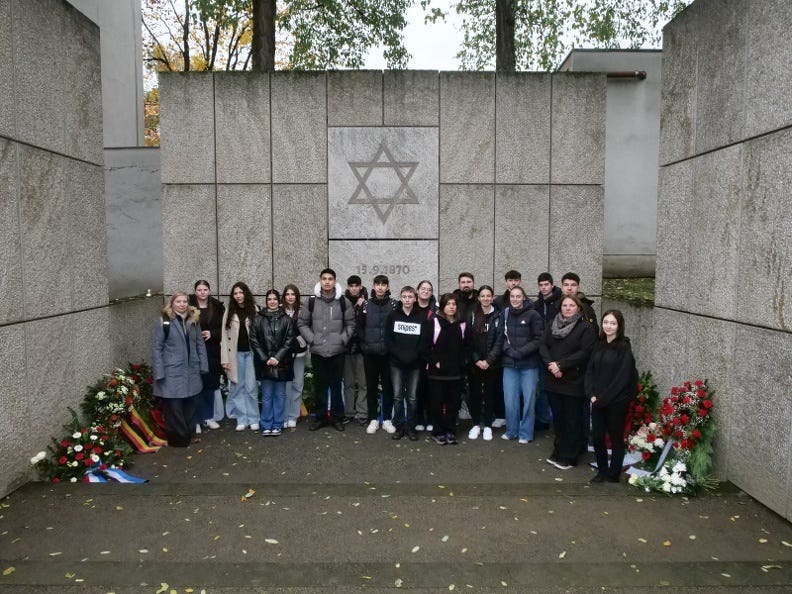

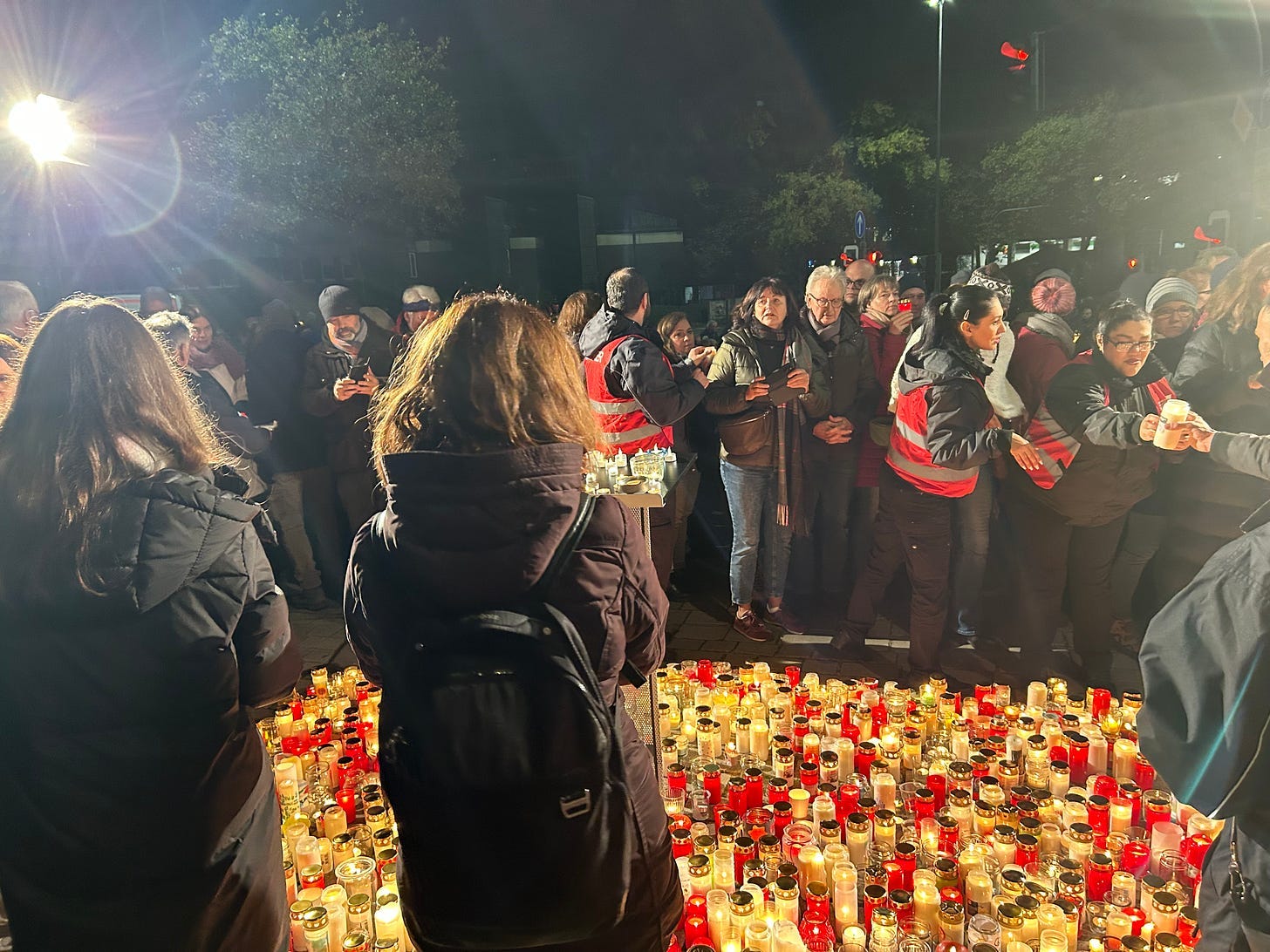
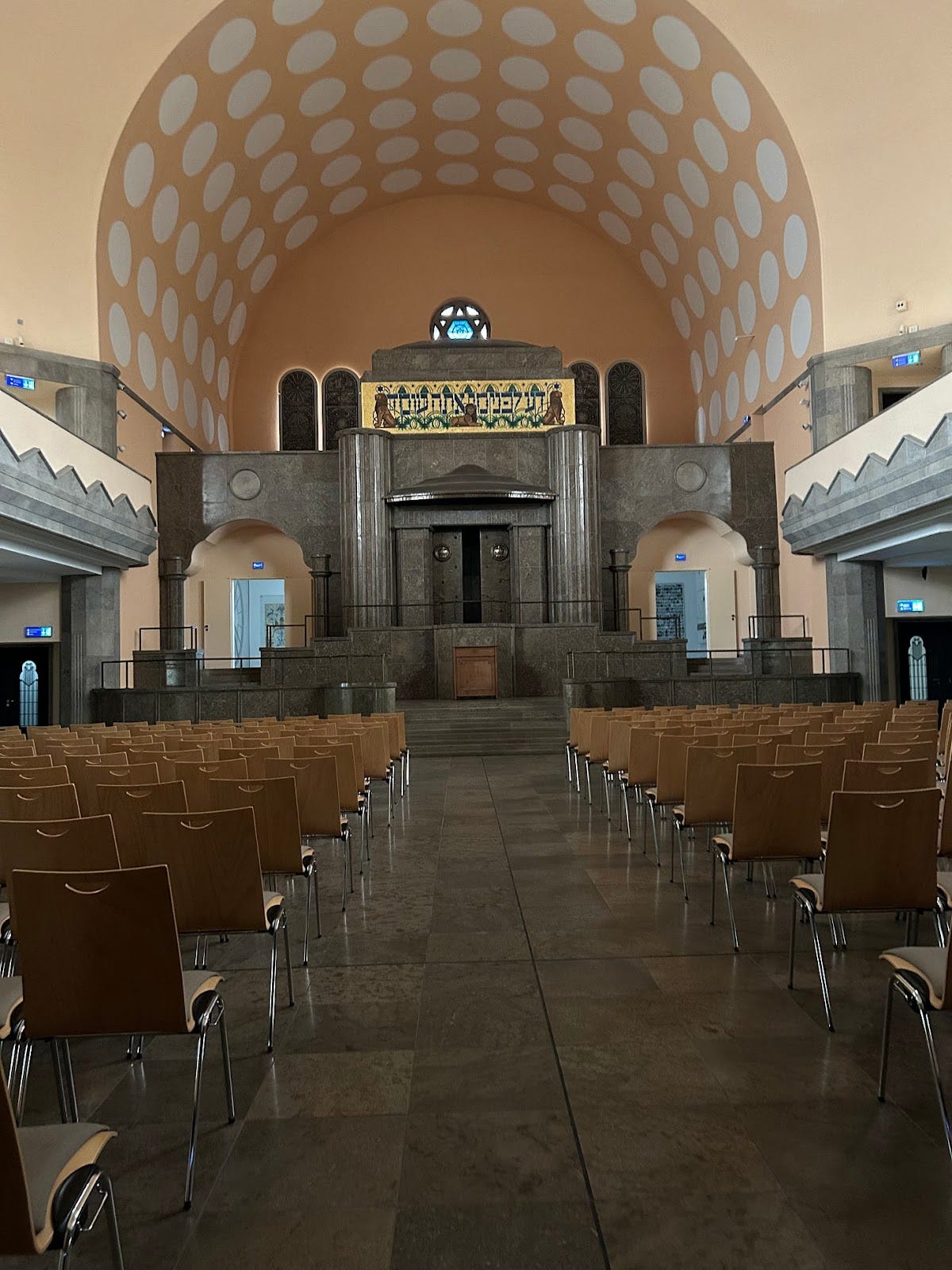
Another beautifully written and thoughtful post. Thanks.
Yes, unbelievably sad.
To understand that “G-D lives in the praises of Israel”, and that they had been forcibly removed, murdered! Where does anyone think that G-D went?